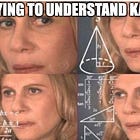How to apply the teaching of karma.
Q&A: Is there such a thing as collective karma? Part V
Note: These next few articles will be devoted to answering questions asked by readers. If you have questions, please submit them by clicking the button below.Is there such a thing as group karma or collective karma, not just the individual?
For example, the karma of a nation?
As an example, in the 1920s we went through the Great Depression. People said it felt like "getting the rug swept up under them."
Right after, the US experienced a polio wave, and the president that got us out of the Depression was FDR, who had...polio.
I feel this for a lot that is going on in the world right now…
Om Sri Gurubhyo Namah. Salutations to all the teachers.
Over the past several weeks, we have been investigating whether or not such a thing as collective karma exists, by examining it from various different angles.
We first began with an exploration into the idea of collective karma, breaking it down into the four aspects of karma - the decision, the action, the result of the action, and the tendency in the mind formed as a result.
We then further explored these tendencies at the group level, investigating examples of collective tendencies that exist at the group level.
Next, we looked into these collective tendencies from the angle of when we feel others bring out something within us (e.g. “you bring out the best in me”, “you bring out the worst in me”, etc.). This was followed by a look at shared experience, and collective action.
Finally, last time, we looked into collective karma as repetitive patterns in the form of other people that seem to appear and reappear within our lives - when one difficult person leaves, for example, another seems to magically appear.
You can find these articles here:
The goal of Yoga and Vedanta - the primary philosophies discussed in this newsletter - are not to understand karma, but rather to break free from it altogether. Given this, it is quite interesting that the topic of karma is one of the most popular categories of questions.
However, in discussing karma, we must be very careful about when and how to apply the teaching. Otherwise, we may fall into the trap of diminishing our own progress. This will be the topic of today’s discussion.
How to correctly apply the teaching of karma
In discussing this topic, we must be mindful about how to apply the teaching. Specifically, we must be careful to only apply the teaching of karma to ourselves, and not to those around us.
P: Why?
The idea of karma can only be correctly applied to oneself, without inflicting violence upon others in thought or word.
P: Why?
Jogi: If you apply the teaching of karma to another person - e.g. telling them you are suffering because of your past karma - it can easily slip into victim-blaming. But when applied to yourself - e.g. telling yourself that you are suffering because of your own actions - it is accountability.
P: Can’t it just be self-blame? What is the difference between accountability and self-blame?
Jogi: The distinction is in the sense of agency. With self-blame, the focus is on the judgment of past actions, whereas with accountability, the judgment of past actions is only performed insofar as it leads to a different course of action in the future. That is, with accountability, one takes account of what they could have done better so that they can improve the situation moving forward. On the other hand, with self-blame, one judges their past actions with no potential for recourse except self-hatred.
P: Ok, so how does this apply to karma?
In applying the teaching of karma to oneself, there are three aspects:
Judgment
Investigation
Agency
First, there is the judgement of your current result as pleasant or unpleasant - “good” or “bad.”
Second, there is the investigation of the potential cause of the effect you are experiencing.
Third, there is the agency to act differently in the future to improve your karma, so as to no longer suffer.
Now let us ask how the teaching of karma changes when we apply it to another person.
The first aspect - judgment - cannot truly be applied to another person.
You can only judge their experiences through your own lens of likes and dislikes, and so there is no way to know the qualia of their experience. For example, you may see someone who has won the lottery and consider them to be very lucky, whereas from their own perspective, they may know that their distant relatives are going to come out of the woodwork, asking them for money, and so feel as though a great misfortune has come upon them.
From your perspective, on the outside looking in, you may classify this as a result of good karma, whereas it may in fact be the result of bad karma.
In this way, the first aspect of karma, judgment, cannot be applied to another person.
The second aspect - investigation - can be applied to another person to about the same degree that it can be applied to oneself.
For example, if you are suffering right now, you may - with deep and honest inquiry - be able to uncover the cause of your suffering. However, even if you are able to uncover one or two causes, you will not be able to see the entire web of causes that led to your suffering in this moment.
All you can know is that your past actions resulted in the present situation. When applying the teaching to another person, depending on your level of familiarity with their lives, you may be able to uncover one or two causes of their present situation.
However, just like when applying the teaching to oneself, you will not be able to see the entire web of causes that led to the present situation, although you can know that it is the result of their past actions.
The third aspect - agency - can only be applied to oneself.
You can look at your present situation and resolve to change your actions, to (attempt to) generate future results, in accordance with your desires. However, you cannot make the same choice on behalf of another person.
To summarize this, while we can apply (or try to apply) investigation of the causes of karmic results to both ourselves and to others, we can only correctly apply judgment and agency to ourselves.
Given this, we must conclude that we cannot apply the teachings of karma to other people in a way that serves any useful purpose.
Just as this is true for individual karma, it is also true for the concept of collective karma.
To make this clear, consider a simplistic view of “collective karma” as karma that is shared by a group of people. Applying the teaching to this interpretation of collective karma, one can easily fall into the trap of using the teaching to justify various horrendous actions that have been carried out against entire races, communities, and nations.
For example, if we were to consider the collection of Jewish people in Western Europe at the time of the Holocaust, this imagination of collective karma would imply that the horrors of the Holocaust were a consequence of their own past evil actions.
This can also be applied to any other collection of people, such as Palestinians today, who are experiencing the horrors of violence against their people.
While this may be interesting as a topic of philosophical investigation, it is not a compassionate view of suffering (ie. goes against the Brahmavihaaras), and also violates the Yamas (ie. violence in thought).
That is, in applying the teaching of karma to this situation, it is easy to fall into the trap of treating it as an intellectual exercise, thereby minimizing the very real suffering that people are facing.
In this way, even applying such an imagination of collective karma to a group of people other than yourself is counterproductive to the goals of Yoga. This is especially true for communities which have been historically disenfranchised or oppressed, but is also the case for communities which are in positions of privilege today.
In summary, we must be very careful about applying the teaching of karma to anyone but ourselves, and especially so when it comes to any teachings around collective karma. Otherwise, we risk - intentionally or unintentionally - causing pain to others.
Furthermore, even if we are not discussing these teachings openly with others, we risk generating a separation between “self” and “other” within our own minds by violating the Yamas, thus hindering our own progress in Yoga.
P: Given that it is impossible to correctly apply the teachings of karma to another person, is it possible to correctly apply the teachings of karma to a collective at all? That is, is there any utility to the idea of collective karma?
Jogi: This is a very astute observation. As we have seen, it is not possible to apply the teachings of karma to another person in a way that has any utility. Given this, any idea of “collective karma” has no utility by itself. However, it can be used to gain an insight into your own individual karma, and thus be useful to one’s practice.
Ways to apply the teaching of karma
As discussed above, not only can the teaching of karma - collective or individual - not be applied correctly to another person, doing so can actually be counterproductive to the goal of Yoga.
To make this clear, following are some examples of how the teaching can be applied in a productive way, as well as examples of how it can be applied in ways that are counterproductive to the practice.
Useful ways to apply the teaching
You notice that you have a tendency towards anger, and realize that this is due to your karma. You use the techniques of Yoga to weaken this tendency over time, generating new karma.
You notice that you have a tendency to speak ill of others, and realize that this is due to your karma. You create a habit of taking a moment before speaking, and adjust your actions (ie. your karma) to generate a new habit of being in line with the Yama of satya.
You notice that your meditation is better when you take a cold shower in the morning, and so decide (karma) to use this as your tapas, and practice it every morning, thereby creating a new tendency (ie. generating new karma).
You notice that you feel calmer around one group of people, and agitated amongst a second group. You adjust your environment initially, but practice the Brahmavihaaras to reduce agitation amongst the second group.
When you suffer from anxiety or sadness due to a difficult situation, you apply the Brahmavihaaras to calm the mind. Over time, you generate a new samskaara for that situation, thereby changing your karma.
When someone asks you for money on the street, rather than looking away, you look them in the eye with compassion, acting on the compassion to the best of your ability. You know that this adjustment in your actions and thought patterns is a shift in your karma.
Counterproductive ways to apply the teaching
When another person suffers, you tell them “this is your karma.”
Someone does something bad to you, and you think “karma will get them back.”
Rather than applying compassion, you discuss how people who are suffering in the world today are suffering only due to their karma.
You notice that you feel calmer around certain people, and agitated amongst others. You adjust your environment to not meet the people who agitate you anymore, and do nothing to change your own tendencies.
Blaming the collective karma of a group that you belong to for the situation that you are facing at the moment.
Intellectualizing the suffering of a group of people by trying to apply the idea of collective karma.
Your friend is having problems at home, so you tell them it’s because they didn’t treat others well when they were growing up.
Next time, we will investigate whether or not all karma is, in fact, collective karma.
Until then, please submit your questions by responding directly to this email, or by clicking the button below:









